
Recently on Cyclingnews.com |
Tales from the peloton, June 15, 2006
Taking care of the kids
In the wake of Lance Armstrong's retirement, American cycling has begun looking to the future of the sport to see if there's another champion of his calibre waiting in the wings. And while the seven-time Tour de France winner may be a once-in-a-lifetime phenomenon, USA Cycling is doing its best through its junior development programs to increase the nation's stocks in the European pro peloton. Cyclingnews' Les Clarke finds out what it takes to look after the young ones.
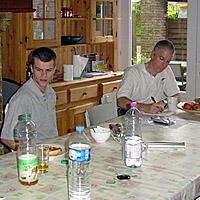
|
USA Cycling's Under 23 program, in one guise or another, has helped produce champion riders such as Armstrong, Hincapie, Julich and Zabriskie through a closely-watched program conducted in the heartland of European cycling, Belgium. With the current crop of American riders mostly aged over 30, the sport's administration in the US is looking ahead to ensure the next generation of American professionals can make the smoothest possible transition to the professional ranks.
The current U23 program has been in place since 1999, and has been the primary source of development for young American riders looking to get their foot in the door in Europe. Several years of sponsorship and some good results has solidified its place at the head of USA Cycling's development push, and the alumni of the program speaks for itself.
"The U23 program began in 1999, and the current CEO of USA Cycling, Steve Johnson, started that program with the help of Noel and Els Dejonckheere in Izegem, Belgium. Dave Zabriskie was in that first crop of riders that came here and raced in that team," says Steve McCauley, director of USA Cycling's junior athlete program.
"This new focus on the younger riders feeds from the success of the U23 program and what it's been able to achieve"-Steve McCauley, director of USA Cycling's junior athlete program |
"It's been successful - it's done what we wanted it to do, which is to develop our guys into pro peloton riders - now Pro Tour riders, of course," he says. "We've tried to push our riders to come to the European level, which is the fastest and highest level of road racing in the world, so we just wanted to get our guys in the game. That's the U23 program's mission - to take our riders to the speeds and level of the European races, and now we want to dig deeper and go all the way down to the 15-16 age group," he says.
It's hoped that success can be passed along the 'development tree' to the riders which feed into the Under 23 program - younger riders aged from 15-18 years. And while the U23 program is the flagship of USA Cycling's development push, recent progressions have paved the way for their junior program to increase in size and scope, granting another level of young rider the chance to experience European racing and providing an edge that should serve them well on their way to becoming professionals. "This new focus on the younger riders feeds from the success of the U23 program and what it's been able to achieve," McCauley explains.
Something that can be a big hurdle for development programs is money, and McCauley tells us that the generosity of those who support the sport back in the States plus a new sponsor helps pave the way for new projects such as the extension of the junior program. "There are really two primary sources [for funding] - the Olympic Committee sponsorship in the US is essentially divided between all the Olympic sports; but it's strictly sponsor money - there's no government funding for any of the sport in the US, it's all from Olympic sponsorship."
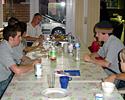
|
"In our case we also use the funding from our foundation - the USA Cycling Development Foundation started exactly for that reason - to raise money for athletes to support the development of cycling," he says before adding that, We raise money from private individuals - they give us anything from five to 25,000 dollars on an annual basis, and it's those cycling aficionados that essentially give a good deal of our athletics development budget which pays in part for this program," he explains.
Processor producer AMD (who also sponsor the Discovery Channel team) have begun sponsorship of the U23 program, which has helped a lot with that particular squad, according to McCauley. "We do have a sponsorship deal this year with AMD; they're sponsoring our U23 program in Belgium. That really helps us to accomplish a little bit more with that program."
It's a little tighter as far as the juniors are concerned, but they're starting on the right foot. "As far as the junior program goes, it's being funded in part by the foundation and there's maybe some money from the Olympic Committee that can be co-mingled with those budget funds to help pay for it - but we don't have a sponsor yet for the junior program, and that's one thing we'll be looking for," McCauley says.
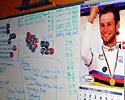
|
McCauley is enthusiastic about what's in store for some of America's best and brightest juniors as he explains. "We have plans to bring our 15-16 riders over to Belgium this summer after their national championships; we're going to bring seven of the top guys we identify through our development camps to come and do home stays. They'll do home stays and compete twice a week, which is the limit for juniors in Belgium, and get a taste of what it's like."
And in the country of the current road race world champion, Tom Boonen, there's no better place to learn the trade than with their older countryman who are also plying their trade in Belgium; it's a full program for those giving it their all on the roads of Flanders. "They'll all be based in the area [Izegem, where the U23 house is] and meet there for certain activities. We've also got 15 of our 17-18 age group juniors, so we've got six first years and nine second years that are competing for anything from four to six weeks during the May/June period prior to nationals. Every one of them will do at least one stage race, some other large UCI one-day races and as much local racing as they can - which of course is very difficult," says McCauley.
"Juniors have always been the one group of riders in the US...that everyone wants to help"-McCauley speaks about the willingness of older riders to help junior riders |
"All of these guys will return for nationals, compete in nationals with the goal of qualifying for the world championship team. If they do qualify they'll come back for two weeks to do two stage races in preparation for world championships. They'll once again be based out of the U23 house," he adds.
McCauley stresses that this isn't the establishment of a new program, rather the development of an existing one. "We've always had a junior program, but it was much smaller - only six or seven riders would come for a maximum of three weeks. We want them to be racing against the guys they'll most likely be up against at world's, but we also want them to get a taste of what it's like to race and live here, and what that's going to take," he says.
"A lot of the guys who come here are thinking long-term; they want to come back and stay here when they're U23 riders to have a chance of making a contract with hopefully the Discovery [Channel] team - and if that doesn't work out any of the other Pro Tour teams. Again, that's our goal - to place riders on Pro Tour teams."
It's a pretty cut-throat affair, and much like the race to secure jobs once college is finished, these riders have to make the most of their time in the hotbed of European cycling. To continue that analogy, the U23 riders are like the college graduates, the 17-18 riders sophomore students and the 15-16 riders freshmen.
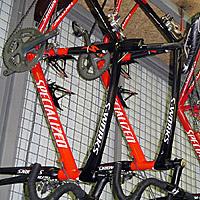
|
The stakes are raised according to where each rider sits on that particular tree. "At the junior level there's less emphasis on results than at the U23 level - when you reach the U23 level you have a limited amount of time to make that Pro Tour team, and if you're not able to do that it doesn't spell the end of your racing career, because there are a lot of good domestic racing teams in the US, but hopefully by bringing 15 to 18 year olds over they get a taste for living in Europe and understand what it's all about," says McCauley.
To make that transition smoother there are some 'extra curricular' activities that even pro riders have to undertake to make the jump into the European lifestyle, as McCauley explains. "We're planning on doing some Dutch and maybe French lessons for our 15-16 age group juniors this summer - we're going to encourage them to learn the language because being able to assimilate will make life much more palatable for a young guy coming over to Europe who may encounter a culture shock when they arrive here."
Just like the freshman or the sophomore at college, funding for the junior program is based less on results and more on getting juniors in the right place to take advantage of their talent. Parents are more likely to financially support a younger student who is starting off than a graduate who has all the skills and capacity to earn a decent living - the same applies in the case of junior cycling development. "Juniors have always been the one group of riders in the US - from the collegiate through to the masters level - that everyone wants to help. We have that going for us, and I think with this program that level of support will only increase once they see what we're doing," says McCauley.
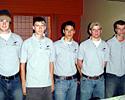
|
"I think our major donor group is focussed on what happens with their money, so yes, they want to see results, and success. It's a pipeline that funnels into a very small opening - we know each year that we only have a few riders that will possibly get a pro contract, so if we can achieve that, then it's huge for us. They're [the donors] also very happy to see that; the results are important in the end, but having a stable program for the juniors, a platform and a chance for them to come over, will be well received," he adds.
This indicates that USA Cycling is as serious as ever about getting their young riders into the swing of things, but McCauley is also quick to point out that to get a junior rider to this level takes plenty of work back home. "Almost every one of these guys comes from a well-organised, junior team effort. So if it weren't for those well-organised efforts, where they have really focussed coaching - and in some cases parents that are coaching - we wouldn't have them. There wouldn't be people to compete against these European guys at the 17 and 18 age group," he says.
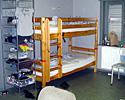
|
And speaking of the local racing scene, the number of juniors racing has almost doubled in the last two or three years, largely as a result of Lance Armstrong's exploits and the number of American pros in the Euro peloton. "I think every successful rider in the pro peloton helps fuel the sport in the US," says' McCauley.
"Lance obviously led the charge with success in the Tour, which did nothing but good for USA cycling and our membership, plus the number of people interested in racing and cycling in general. That now continues with all the other riders who are having some success too; there are guys who deserve credit, but I'd say the bulk of the interest has come as a result of Lance," he adds.
"We still depend on the local promoters and associations because that's where it all starts, and that's where all the guys in the U23 house started. You have to give credit [for success] to those folks too, and we rely on them - we're interested in their promotion of junior racing so that more kids get the opportunity to compete," says McCauley, which indicates USA Cycling is pleased with the health of the local racing scene.
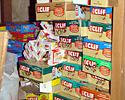
|
USA Cycling's efforts have begun to create a snowball effect, with added emphasis now on junior development from areas other than the administration itself. "We've had a number of other teams in the US that have, I believe, sprung from our efforts with the U23 team," says McCauley.
"They started as U23 teams and picked up a number of guys who came through our program, then developed into all-age continental teams because it's a natural progression - the U23 guys have to grow up and need somewhere to move on to. Now there are a number of teams that have become successful as a result, in part, of our efforts at the ground level," he adds, citing VMG Racing and TIAA-CREF as examples of this, both of which are giving young riders a place to show their wares. As they say, imitation is the finest form of flattery, so Steve McCauley and his crew are doing something right with the future of USA's cycling prospects.
Photography
For a thumbnail gallery of these images, click here
Images by Les Clarke/Cyclingnews.com
- With 'Uncle Tom' Boonen watching over them, the housemates are allocated chores in the house
- Some of the 17-18 juniors in the house - (l-r): Cody O'Reilly (Santa Barbara, CA), Travis Burandt (Woodlands, TX), Benny Volotzkyz (Los Angeles, CA), David Talbot (Chatanooga, TN) and Zac Lake (Greenville, SC)
- Lots of Clif bars for lots of hungry bike racer boys
- Steve McCauley (r) and a couple of the junior lads at the dinner table just after breakfast
- A few Specialized steeds are waiting for the day's racing
- A multitude of wheels are needed for racing, training and getting around on the roads of Belgium
- Rollers are a must when the often-inclement Belgian weather forces the guys to train indoors
- In case you didn't know where to put your shoes and helmet, here it is
- One of the dorm-style rooms that the junior riders sleep in when they're in Belgium
- A tale of two rooms... on the left we have a room occupied by riders, on the right we have a room without riders - spot the difference?
- Keeping the stocks plentiful is all part of running a house that can have up to 22 riders in it at once
- Breakfast time in the house with Steve McCauley and the lads
- Breakfast is done for David Talbott, Cody O'Reilly and Travis Burandt
- The boys have to eat regularly and this was their first meal of the day, before their race meal in a couple of hours
- The idol of many riders, Tom Boonen, accompanies the list of chores for each day
- The 'shit list' of things to do in the house - this breeds responsibility for young riders who may not always enjoy doing the chores
